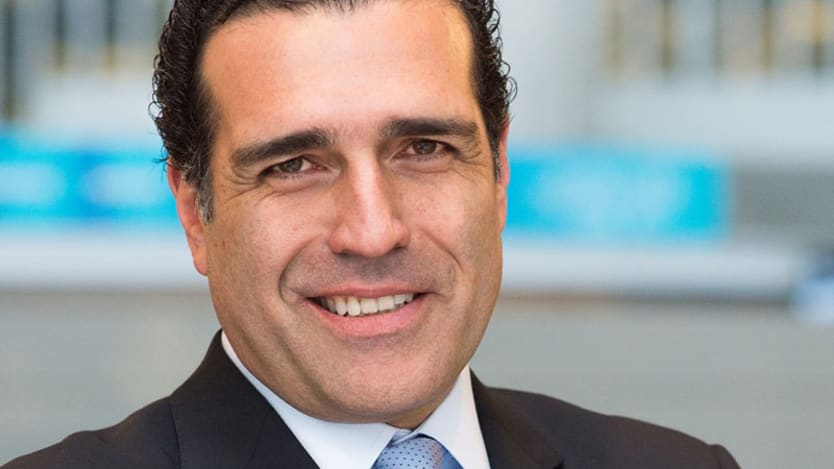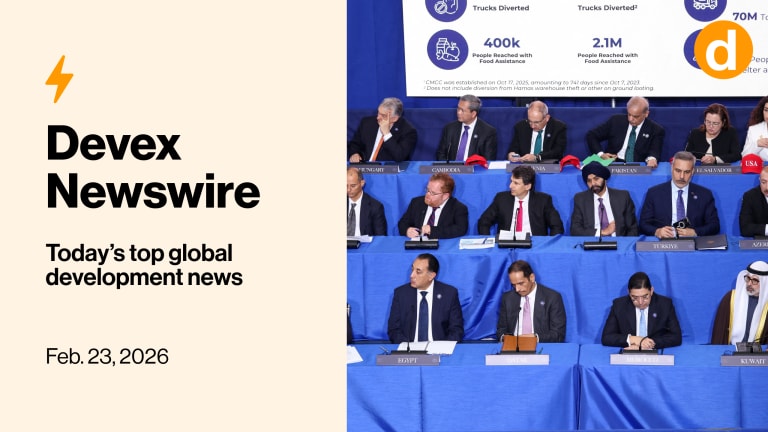World Bank Inspection Panel chair: 'Whenever we say something, the building shakes'

WASHINGTON — Last week, the World Bank’s Inspection Panel marked its 25th anniversary with speeches recalling the early days of what was then an experiment met with resistance. Today, development banks worldwide have similar independent complaint mechanisms, thanks in part to the Inspection Panel’s example, though in some cases those models have a broader host of tools and instruments to hold their institutions accountable.
“I have not, in my five years here, seen any case where we didn't come up with the truth and that there was not a proper response.”
— Gonzalo Castro de la Mata, chairman, the World Bank Inspection PanelIn the past year, the bank’s board of executive directors has been reviewing the Inspection Panel to determine its boundaries, identify accountability gaps, and address questions about the panel’s mandate.
On Monday, the Inspection Panel released a summary of the review process to date. Executive directors approved a number of measures, including formally recognizing the Inspection Panel’s advisory role, formalizing practices to coordinate with co-financers’ accountability mechanisms, and updating the process for sharing investigation reports with requesters before board meetings.
The board will continue discussions for another six months on a number of different issues, according to the chair summary released about the process.
“Today, I don’t think you could imagine a World Bank without an inspection panel,” said Gonzalo Castro de la Mata, the chairman of the Inspection Panel, whose five-year term is coming to an end. The panel’s greatest legacy is not in the specific cases it has adjudicated, but in the policies it has changed, he added.
Castro de la Mata pointed to two gender-based violence cases — one in Uganda and the other in the Democratic Republic of the Congo — that the panel investigated in the past few years. The investigation resulted in action taken on those specific projects but also had a broader impact. The bank has hired experts and developed internal guidelines to try to identify and prevent these issues in the future, and has created a Global Gender-Based Violence Task Force, he explained.
“On a case-by-case basis, it’s a very tiny percentage of bank projects that we see, so the real importance is the learning that comes from that. Because once you discover that something is going wrong then the bank adjusts and changes policies, procedures, training, hires new types of staff, and that has a huge impact over the long term,” Castro de la Mata said.
Is the World Bank's Inspection Panel due for a rethink?
The World Bank has initiated an independent review of the Inspection Panel as it prepares to court the private sector for more involvement in its development projects.
Devex spoke with Castro de la Mata before the latest announcement in the review process, about his tenure as chairman, how he views the review process, and the panel’s greatest challenges.
The interview has been edited for length and clarity.
The World Bank has changed quite a bit during your tenure on the Inspection Panel. How have you seen things change? Do you think the panel has the tools it needs?
Other banks have accountability mechanisms that have more functions, but I don't believe that effectiveness is an automatic result of having more tools. You can still be very effective if there is a confluence of factors, one of them is the commitment of leadership here at the bank, and of course, the board as well, to ensure that what we say is heard and properly acted on. Of course, having additional tools can make us more proportionate and now the board is undertaking a review of this.
It’s not just a matter of adding things so we can do more, but rather what is the job that needs to be done, and what are the types of tools that we may benefit from. And with a new social and environmental framework, some of those tools may need to wait a couple of years to see the types of new projects we get.
There has been some talk that the panel should have a dispute resolution function. Is that being considered as part of the review?
It’s on the table as part of the review. Other mechanisms have that function. I think in some cases it can be very useful, [but] in most of the very difficult cases we face, maybe the compliance review that we do is a stronger tool. So having an additional tool like dispute resolution will help us again to be more fit for purpose there may be cases that are better dealt with with dispute resolution — but I haven’t felt that lacking dispute resolution has impacted upon our effectiveness.
What about the ability to initiate investigations? Other accountability mechanisms have that ability, whereas the Inspection Panel doesn’t. Is that being considered?
It’s not in our mandate and it’s not currently in the review of our toolkit. It has not been considered as something that we need to do. I think we're quite busy with just receiving complaints.
“I think the weakest link is when, in the end, the people that complained may not get all of the redress they require.”
—However, something that is important, and that we're already doing, is advisory services. To be able to draw from experience, from panel cases and then to draw broad lessons. We have done one on resettlement, another one on indigenous peoples, another one on environmental assessment, and another one on consultation and participation. Those are all really important issues and those lessons from past panel cases are very important going forward.
There have been some complaints in the past that the panel doesn’t always hold the bank to account for carrying out its recommendations. Do you think the panel needs a greater enforcement mechanism?
I don’t agree with that. I think that whenever we say something, the building shakes.
And I think that the type of response you get at the board level, and at the level of management is very forceful. Of course, there is an adversarial relationship by nature, so management has a chance to prepare a response, to explain, and to do things in context. But I have not, in my five years here, seen any case where we didn't come up with the truth and that there was not a proper response.
Opinion: Lessons from the World Bank Inspection Panel on environmental assessment
When it comes to evaluating development proposals ahead of making funding decisions, there are key lessons the World Bank can draw upon to improve project effectiveness. Gonzalo Castro de la Mata and Dilek Barlas detail lessons about environmental assessment the panel has identified for the bank.
I think the weakest link is when, in the end, the people that complained may not get all of the redress they require. Because sometimes a project is closed, sometimes there is nowhere for the finance to come from. That is perhaps the weakest link in the whole chain but that is very rare. Most of the time, the bank is able to find ways to compensate, mitigate, and fix the problems that we've found.
What do you see as the greatest challenges for the Inspection Panel?
I think the most difficult issues the bank faces are social issues because the development community has learned to deal with environmental challenges very well.
So 30 years ago, maybe there were difficulties in environmental projects — today there is technology, there is knowledge, there are methodologies, there are experts.
When you start to deal with social issues, such as involuntary resettlement, and you have to move hundreds of people out of their houses, [that is] where things are much more difficult. So there is still, I think, a space for further learning in the social issues.
Search for articles
Most Read
- 1
- 2
- 3
- 4
- 5








